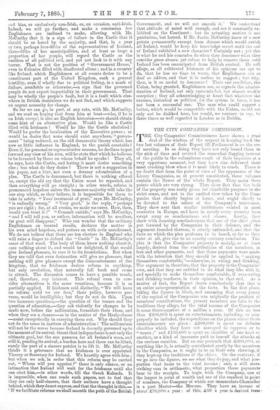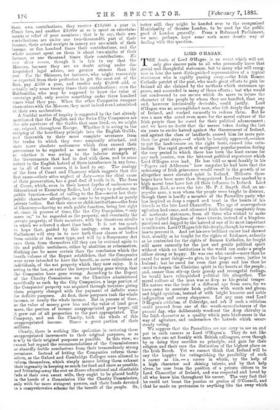THE CITY COMPANIES' COMMISSION. THE CITY COMPANIES' COMMISSION. T HE City
Companies' Commissioners have shown a good deal of the wisdom of the serpent in keeping back the two last volumes of their Report till Parliament is on the eve of meeting. In so doing they have not only issued them in the nick of time and revived the somewhat flagging interest of the public in the voluminous result of their inquiries at a very opportune moment, but they have also delivered their most crushing blow when it is most likely to crush. There is no doubt that from the point of view of the opponents of the Livery Companies, as at present constituted, these volumes contain the flower of the whole Report. They make three points which are very strong. They show first that the bulk of the property was really given for charitable purposes in the strict sense, and not in the exalted view taken by the Companies that charity begins at home, and ought chiefly to be devoted to the solace of the Company's inner-man. They show next that similar institutions existed in most countries in Europe, and have in nearly every country been swept away as anachronisms and abuses. Lastly, they show with damning conclusiveness that one of the chief pleas put forward by the Companies in their defence, and the argument founded thereon, is utterly unfounded, and that the facts on which the plea professes to be based, so far as they exist at all, give rise to an exactly contrary conclusion. The plea is that the Companies' property is mainly, or at least largely, derived from the contributions of the members, is fees and other payments, and that those payments were made with the intention that they should be applied in " making themselves comfortable,"—otherwise, in eating and drinking. The argument is, therefore, that the property is the Companies' own, and that they are entitled to do what they like with it, and specially to make themselves comfortable, if over-eating and drinking conduces, in their opinion, to that end. As a matter of fact, the Report shows conclusively that this is an entire misrepresentation of the facts. In the first place, taking the figures in block, and assuming that every penny of the capital of the Companies was originally the product of members' contributions, the present members are false to the traditions they allege, for the total income of the Companies is some three-quarters of a million a year. Of this no less than £400,000 is spent on entertainments, including, as may properly be included, the expenditure on the places where those entertainments are given ; £200,000 is spent on definite, charities which they have not managed to suppress or to " annex ;" and £150,000 is spent on charities of one kind or another, as a kind of insurance paid to buy-off the attacks of the envious outsider. But no one pretends that £400,000, or anything like it, is actually contributed yearly by the members to the Companies, as it ought to be on their own showing, if they kept-up the traditions of the elders. On the contrary, if we go into the figures, we see what they do pay, and what proportion that bears to the total income ; and, a still more striking sum in arithmetic, what proportion those payments bear to the receipts. To begin with the Company, one of the largest in point of wealth and one of the smallest in point of numbers, the Company of which our immaculate Chancellor is a past Master—the Mercers. They have an income of about £90,000 a year : of this, £40 a year is derived from
their own contributions, they receive £10,000 a year in Court fees, and another £9,000 or so is spent on entertain ments or relief of poor members ; that is to say, their own contributions are under one two-thousandth part of their income, their actual receipts in money are one-ninth of their income, or five hundred times their contributions, and the whole amount spent on them is about two-ninths of their income, or one thousand times their contributions. Es
rvto disce omnes, though it is fair to say that the
Mercers, because they are no doubt acting under distinguished legal advice, are greater sinners than the rest. For the Skinners, for instance, who might reasonably be expected from their profession to get the most out of the flint, pay £350 a year, and receive only £9,000 odd, or actually only some twenty times their contributions ; even the Goldsmiths, who may be supposed to know the value of sovereign gold, only receive something under three hundred times what they pay. When the other Companies compare themselves with the Mercers, they must indeed stand astonished at their own moderation.
A fruitful matter of inquiry is suggested by the fact already mentioned that the English and the Swiss City Companies are the sole survivors of the Guilds that once lived, or, we might fay, reigned, throughout Europe. Whether it is owing to the creeping of the hereditary principle into the English Guilds, and therewith to their more complete severance from the trades to which they were nominally attached, and their more absolute uselessness which thus caused their possessions to be regarded as more like private property, or whether it was owing to the inferior strength of the Governments that had to deal with them, and to some extent to the English hatred of State interference in any form, or to all of these causes, it is hard to say. The analogy of the Inns of Court and Chancery which suggests that the first oause—their utter neglect of duty—was the chief cause of their preservation, has a good deal of truth in it. The Inns of Court, which, even in their lowest depths of uselessness as Educational or Examining Bodies, had always to perform one public function—that of calling to the Bar—never lost their public character altogether, or came to be regarded as purely private bodies. But their sister or child-institutions—the Inns of Chancery—having no such public function. being lost sight of, came in process of time, like the City Companies, "only more so," to be regarded as the property, and eventually the private property, of their members, with the disastrous results to which we referred a short time back. It is not too much to hope that, guided by this analogy, even a moribund Parliament will step in to save both these classes of bodies from suicide of the worst type, and will by a Suspensory Act save them from themselves till they can be restored again to life and public usefulness, either by abolition or reformation. Nothing can be more certain than the conclusion which the fourth volume of the Report establishes, that the Companies were never intended to have the benefit, as mere collections of individuals, of the net property which they now enjoy. It is owing to the law, or rather the lawyer having gone wrong, that the Companies have gone wrong. According to the Report of the Charity Commission on the Charities administered specifically as such by the City Companies, a large portion of the Companies' property was acquired through testators giving them property charged with the payment of definite sums for definite purposes. At first, these purposes took the whole income, or nearly the whole income. But in process of time, as the value of money grew less and the value of land grew more, the portion of income unappropriated grew larger, till it grew out of all proportion to the part appropriated. The Company, and not the Charity, took the whole of this unappropriated income. Hence a great portion of their millions.
Clearly, there is nothing like spoliation in restoring these unappropriated increments to their original purposes, or as nearly to their original purposes as possible. In this view, we cannot but regard the recommendations of the Commissioners as absurdly feeble conclusions from their tremendously strong premisses. Instead of letting the Companies reform themselves, as the Oxford and Cambridge Colleges were allowed to reform themselves, which simply means letting them exhaust their ingenuity in keeping as much for food and show as possible, and frittering-away the rest on divers educational and charitable fads at their own sweet wills, they ought to be placed bodily in the hands of a Commission like the Charity Commission, Only with far more stringent powers, and their funds devoted to a comprehensive scheme for the benefit of the people. Or, better still, they might be handed over to the reorganised Municipality of Greater London, to be used for the public good of London generally. From a Reformed Parliament, we mar, perhaps, hope some such more drastic way of dealing with this question.



































 Previous page
Previous page